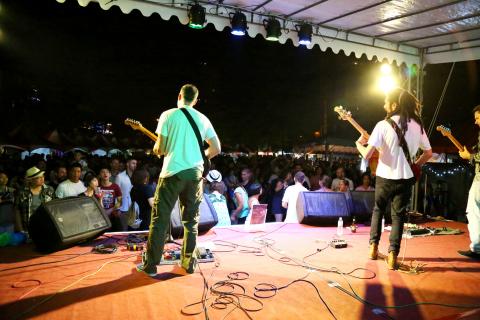The Compass Taichung International Food and Music Festival will return to Art Museum Parkway for this weekend’s outdoor party.
“This year we’re back at our old home,” said Douglas Habecker, co-publisher of Compass Magazine, the event’s sponsor. Last year’s renovations at the parkway forced the festival to temporarily relocate.
Seventeen Taichung-based bands will take the stage on Saturday and Sunday, with musical genres ranging from classic rock to hip hop. Point 22, Dread Rider and Pat Reid will return, as will Dr Reniculous Lipz & the Skallyunz. Singer-songwriters Lauren Leach and Nell will also perform.

Photo courtesy of Nima Raven
falling on hard times
Taichung’s once vibrant music scene has fallen on hard times, with only a handful of venues hosting lives bands.
A deadly nightclub fire six years ago resulted in the closure of many of the city’s bars, restaurants and music venues. While some local musicians opted to move away, others have stayed in hopes of reviving the music scene.
This weekend’s festival should be a reminder of the city’s musical heyday.
“We’re not anywhere near to where used to be,” Habecker said. “This event is an opportunity for musicians to showcase their talents.”
Besides music, the festival will feature roughly 50 food, clothing and arts and crafts vendors. Area restaurants and bars will offer local and international fare, with Taiwan Beer providing the libations.
Non-profit and charity organizations will also be represented, including the International Women’s Association of Taichung, Taichung PAWS and Hong Yu Social Welfare Foundation.
With a forecast of clear skies and temperatures in the mid to upper 20s, organizers are hoping for a strong turnout. As in past years, 18,000 people are expected to attend.
“Have a drink, eat some food,” Habecker said. “It’s going to be a great way to pass the weekend.”

Towering high above Taiwan’s capital city at 508 meters, Taipei 101 dominates the skyline. The earthquake-proof skyscraper of steel and glass has captured the imagination of professional rock climber Alex Honnold for more than a decade. Tomorrow morning, he will climb it in his signature free solo style — without ropes or protective equipment. And Netflix will broadcast it — live. The event’s announcement has drawn both excitement and trepidation, as well as some concerns over the ethical implications of attempting such a high-risk endeavor on live broadcast. Many have questioned Honnold’s desire to continues his free-solo climbs now that he’s a

As Taiwan’s second most populous city, Taichung looms large in the electoral map. Taiwanese political commentators describe it — along with neighboring Changhua County — as Taiwan’s “swing states” (搖擺州), which is a curious direct borrowing from American election terminology. In the early post-Martial Law era, Taichung was referred to as a “desert of democracy” because while the Democratic Progressive Party (DPP) was winning elections in the north and south, Taichung remained staunchly loyal to the Chinese Nationalist Party (KMT). That changed over time, but in both Changhua and Taichung, the DPP still suffers from a “one-term curse,” with the

Jan. 26 to Feb. 1 Nearly 90 years after it was last recorded, the Basay language was taught in a classroom for the first time in September last year. Over the following three months, students learned its sounds along with the customs and folktales of the Ketagalan people, who once spoke it across northern Taiwan. Although each Ketagalan settlement had its own language, Basay functioned as a common trade language. By the late 19th century, it had largely fallen out of daily use as speakers shifted to Hoklo (commonly known as Taiwanese), surviving only in fragments remembered by the elderly. In

William Liu (劉家君) moved to Kaohsiung from Nantou to live with his boyfriend Reg Hong (洪嘉佑). “In Nantou, people do not support gay rights at all and never even talk about it. Living here made me optimistic and made me realize how much I can express myself,” Liu tells the Taipei Times. Hong and his friend Cony Hsieh (謝昀希) are both active in several LGBT groups and organizations in Kaohsiung. They were among the people behind the city’s 16th Pride event in November last year, which gathered over 35,000 people. Along with others, they clearly see Kaohsiung as the nexus of LGBT rights.